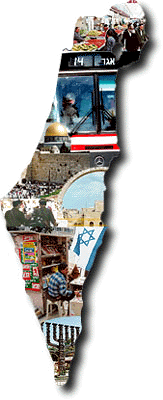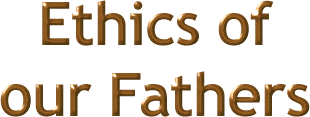Light Lines - Vayishlach
Parshat Vayishlach
18 Kislev 5760 / 27 November 1999
Ohr Somayach Home Page
A buffet is not a Jewish invention. Have you noticed whenever you eat at a buffet, you always end up eating about twice as much as if you'd been served a set meal? The Torah says "And you will eat and you will be satisfied, and you will bless G-d." Eat. Be satisfied, and then thank the One who provides food for the whole world. What does a buffet say?
"Don't look at what you've eaten. Look at what's left! How can you possibly walk away from this gorgeous spread, these tables groaning under their load of delights? Have you no conscience? Get over here and fill up another plate immediately! (Have you tried the smoked salmon yet?)"
Esau says "I have plenty." Jacob says "I have everything."
What's the difference between someone who says they have plenty and someone who says they have everything?
Someone who says they have plenty is telling you that they could have a lot more! Their focus is not what's on their plate. It's on what's left on the tables of life's buffet. Someone who says that he has everything is saying that he's happy with what he has, even though he may have but little. His focus is on the portion that the Creator has provided for him. For only He knows the exact size of the helping needed to preserve our individual spiritual health and fitness.
There are some people who are so attached to their money that their money is more important to them than their bodies.
I have heard that some people even have their bodies deep-frozen in cryogenic suspension - right when they die, hoping that one day they'll be able to continue enjoying their money where they left off.
What makes it all the more surprising is that our Sages teach us that us that tzaddikim (righteous people) value their money more than their bodies.
We learn this from an incident in this week's Parsha. Jacob our Forefather went back alone to collect some objects of minimal value that he had forgotten, even though by doing so he put himself in a dangerous situation, as Esau drew near to attack. You would think that the more a person is immersed in the materialism of this world, the more concerned he would be with his money, and the more spiritual, the less concerned.
However the reason materialistic people are careful with money, is not for the money itself, but for what they can do with it: Pamper their bodies, gain acceptance and status...
So really, it's their bodies which are important to them. The money is only a means to an end. Tzaddikim, on the other hand, value their money more than their bodies only because of the spirituality that they can create with their wealth.
With your body alone, maybe you could build one room in an orphanage — which would probably fall down soon afterward! But with your money, you could hire the best architects and contractors, and build a whole orphanage... and put a plaque on the wall that your grandchildren would be able to look up to.
|
Ohr Somayach Home Page |
 Selections from classical Torah sources which express the special relationship between the People of Israel and Eretz Yisrael Har Hatsofim - Mount Scopus The Hebrew word "hatsofim" and the Greek "scopus" both describe the fact that this mountain "looks over" Jerusalem from its heights. It was here that the Roman legions of Titus camped before capturing Jerusalem, as did the Crusaders in 1099 and the British forces in 1917. Although the Arab legion captured this mountain in the War of Liberation it did not succeed in using it as a springboard for conquering Jerusalem as did these predecessors. With the liberation of East Jerusalem in 1967 the Jewish institutions on the mountain — Hadassah Hospital and Hebrew University — returned to Jewish hands and were restored to public service. |
Light Insight | Love of the Land | Ethics from our Fathers | Response Line Ohr Somayach Home Page |
When a child is educated in school, from where does his education come? From the wisdom of others. For the rest of his life, his education continues in an ongoing process, as each and every encounter with another person has some lesson to teach him. Meeting a person with a positive character trait will inspire him to emulate that trait. Seeing something unbecoming in another person will help him to recognize a negative trait and make him more careful in avoiding it.
A person can also learn much from the compliments of friends and the criticism of enemies. If he receives a compliment which is not wholly accurate, he will strive to develop that positive quality in order to be worthy of such admiration. If a person listens carefully to the criticism of enemies, he will be sure to learn a great deal about the shortcomings he needs to improve upon.
Light Insight | Love of the Land | Ethics from our Fathers | Response Line Ohr Somayach Home Page |
Traffic Theology
Dr. Michael A. Goldenhersh wrote:
According to Jewish law, is it an obligation to obey all traffic laws without exception? This refers both to drivers and pedestrians. For example, is it forbidden to cross on a red light, when it is clear that no vehicles are approaching? Must one worry that others will learn from this behavior, and cross also when crossing is dangerous?
Dear Dr. Goldenhersh,
I asked your questions to a noted Rabbinic authority in Jerusalem. He responded that you must observe traffic laws for two reasons: One is the concept of Dina d'malchuta dina, that the law of the land prevails. Secondly, other people (children) can learn from your actions, so disobeying the laws could bring others into danger.
However, the definition "breaking the law" depends on the way the law is enforced. If the authorities were not so strict; for instance, if they won't fine you for going 60 in a 55 mph zone, it would be halachically permitted to go 60. (We don't advocate that you do so; and we're not saying you don't have to pay the fine if you do get fined for doing so.)
Produced by the Office of Communications
Editor: Raphael Scott Leban
Production: Eliezer Shapiro
Light Insight: Yaakov Asher Sinclair
HTML Design: Michael Treblow
HTML Production: Eli Ballon
© 1999 Ohr Somayach International - All rights reserved. This publication may be distributed to another person intact without prior permission. We also encourage you to include this material in other publications, such as synagogue newsletters. However, we ask that you contact us beforehand for permission, and then send us a sample issue.
This publication is available via E-Mail
Ohr Somayach Institutions is an international network of Yeshivot and outreach centers, with branches in North America, Europe, South Africa and South America. The Central Campus in Jerusalem provides a full range of educational services for over 685 full-time students.









